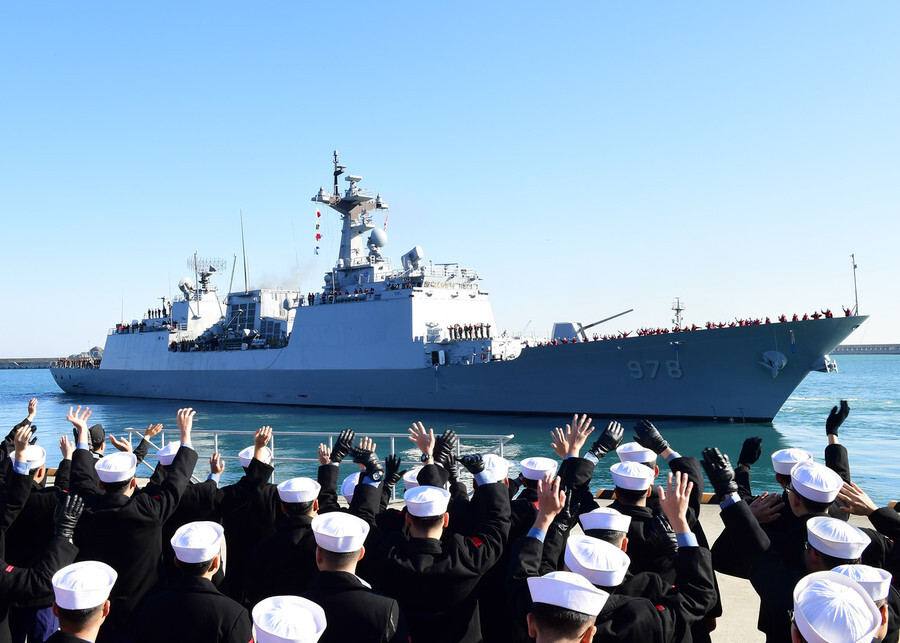hankyoreh
Links to other country sites 다른 나라 사이트 링크
[Editorial] Deploying S. Korean forces to Strait of Hormuz increases risk of military clash
T

he South Korean government decided on Jan. 21 to deploy military forces to the Strait of Hormuz, an area of high tensions between the US and Iran. This decision was apparently influenced by South Korea’s inability to disregard a request from the US, its main ally. But in consideration of relations with Iran, Seoul announced that its forces would be “acting independently” and not joining the US-led security coalition, the International Maritime Security Construct (IMSC). This middle road was probably taken with a view to the precedent set by Japan, which had already decided to make an independent deployment.
Seoul said that the aim of the deployment is to guarantee the safety of its citizens and the free navigation of its ships. As the government explained, the Strait of Hormuz is a critical juncture through which 70% of South Korea’s crude oil imports must pass. With tensions running high between the US and Iran, there’s certainly some validity to the argument that the South Korean military should take responsibility for the safety of ships transporting our crude oil.
That being said, no South Korean ship has been put at risk in the Strait of Hormuz so far. While several ships from other countries came under attack in May and June last year, when military tensions were at their highest as more US troops were deployed to the region, there have been no reports of harm being done since then. There seems to be little reason to think there’s an imminent threat to free navigation. We should be aware that, if anything, deploying a South Korean naval vessel to the vicinity of the Strait of Hormuz increases the risk of an incident, such as an unintended torpedo attack by Iranian forces.
It’s regrettable that the government opted not to seek the consent of the National Assembly for its deployment decision. The government’s position is that, since the Cheonghae Unit has already been deployed to the Gulf of Aden, the National Assembly’s consent isn’t required to expand the unit’s operational scope to include the Persian Gulf. But the Cheonghae Unit’s mission is protecting the safety of Korean citizens and ships from pirates around the Gulf of Aden. For that unit to operate near the Strait of Hormuz, where there’s a considerable risk of a conflict between the US and Iran, should be seen not as simply expanding its operational scope but as a separate deployment altogether, and one that runs a high risk of getting us entangled in a conflict.
We do understand that the government’s decision to make an independent deployment is multifaceted, taking into account our relations with Iran, the US and even North Korea. But the assessment of the international community is that the fundamental responsibility for the security risk at the Strait of Hormuz lies with the US, which unilaterally withdrew from its nuclear deal with Iran. As a consequence, any kind of deployment is likely to be viewed as participation in the US’ unjustified campaign to pressure and blockade Iran. In light of that, the government ought to let the public have a say in the matter, by seeking the consent of the National Assembly, instead of making the decision on its own.
Please direct comments or questions to [english@hani.co.kr]

Editorial・opinion
![[Editorial] Does Yoon think the Korean public is wrong? [Editorial] Does Yoon think the Korean public is wrong?](https://flexible.img.hani.co.kr/flexible/normal/500/300/imgdb/original/2024/0417/8517133419684774.jpg) [Editorial] Does Yoon think the Korean public is wrong?
[Editorial] Does Yoon think the Korean public is wrong?![[Editorial] As it bolsters its alliance with US, Japan must be accountable for past [Editorial] As it bolsters its alliance with US, Japan must be accountable for past](https://flexible.img.hani.co.kr/flexible/normal/500/300/imgdb/original/2024/0417/6817133413968321.jpg) [Editorial] As it bolsters its alliance with US, Japan must be accountable for past
[Editorial] As it bolsters its alliance with US, Japan must be accountable for past- [Guest essay] Amending the Constitution is Yoon’s key to leaving office in public’s good graces
- [Editorial] 10 years on, lessons of Sewol tragedy must never be forgotten
- [Column] A death blow to Korea’s prosecutor politics
- [Correspondent’s column] The US and the end of Japanese pacifism
- [Guest essay] How Korea turned its trainee doctors into monsters
- [Guest essay] As someone who helped forge Seoul-Moscow ties, their status today troubles me
- [Editorial] Koreans sent a loud and clear message to Yoon
- [Column] In Korea’s midterm elections, it’s time for accountability
Most viewed articles
- 1‘Right direction’: After judgment day from voters, Yoon shrugs off calls for change
- 2[Editorial] Does Yoon think the Korean public is wrong?
- 3Where Sewol sank 10 years ago, a sea of tears as parents mourn lost children
- 4Samsung barricades office as unionized workers strike for better conditions
- 5[Column] The clock is ticking for Korea’s first lady
- 6Strong dollar isn’t all that’s pushing won exchange rate into to 1,400 range
- 7Korea, Japan jointly vow response to FX volatility as currencies tumble
- 8Faith in the power of memory: Why these teens carry yellow ribbons for Sewol
- 9Japan officially says compensation of Korean forced laborers isn’t its responsibility
- 10[Guest essay] Amending the Constitution is Yoon’s key to leaving office in public’s good graces